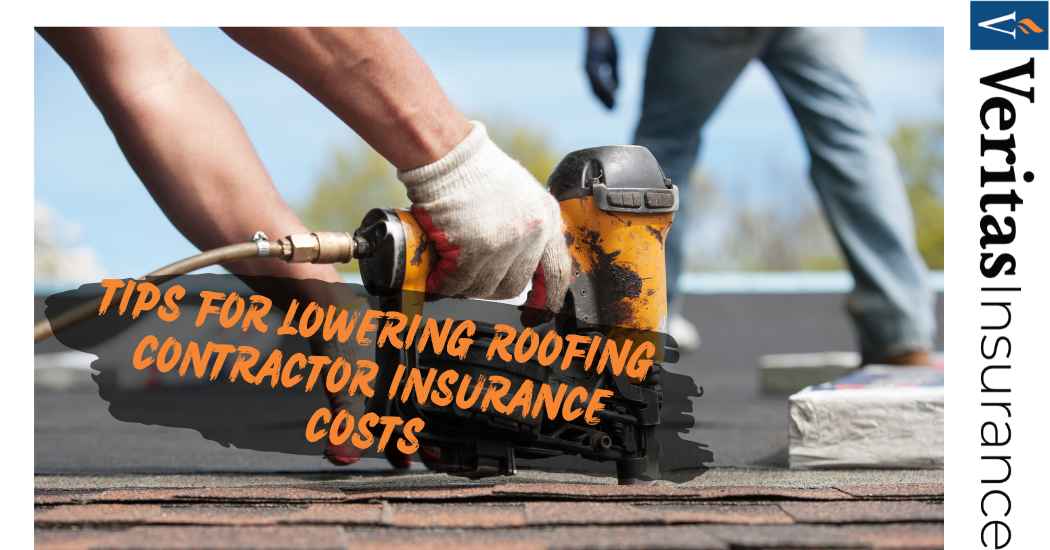9 min read
TIPS FOR LOWERING ROOFING CONTRACTOR INSURANCE COSTS
 Andrew Darlington
:
September 7, 2023 at 11:18 AM
Andrew Darlington
:
September 7, 2023 at 11:18 AM

Click Below and Listen To "TIPS FOR LOWERING ROOFING CONTRACTOR INSURANCE COSTS"
Saving Money without Sacrificing Coverage: Tips for Lowering Roofing Contractor Insurance Costs
Are you a roofing contractor looking to reduce your Roofing Insurance Costs without compromising on coverage? We've got you covered! In this article, we'll share some valuable tips on how you can save money while still maintaining adequate insurance for your roofing business. Whether you're a small Tennessee roofing contractor limited to just jobs in Tennessee or a larger roofing contractor doing business in all of the states in the South East, (Tennessee, Virginia, North Carolina, South Carolina, Georgia, Kentucky, Alabama, Florida, and Mississippi), pretty much all of SEC and for now ACC territory, insurance costs can weigh heavily on your budget. If you are wondering what Insurance Coverages Roofing Contractors need, just click here to read our blog, Protecting Your Roofing Business: The Importance of Proper Insurance for Roofers. However, by implementing smart strategies, you can lower your premiums without sacrificing the coverage you need. From reviewing your policy to shopping around for competitive rates, we'll walk you through the steps to take. Additionally, we'll explore the benefits of bundling your insurance policies, raising your deductibles, and taking advantage of available discounts. By the end of this article, you'll have a better understanding of how to maximize your insurance coverage while keeping costs in check. Don't let high insurance premiums dampen your success as a roofing contractor. Read on to discover practical ways to save money on your insurance without skimping on essential coverage.
Importance of roofing contractor insurance
As a roofing contractor, having insurance coverage is crucial for protecting your business and managing potential risks. Accidents can happen on the job, and being adequately insured ensures that you're financially protected from liability claims, property damage, and injuries. Additionally, most states require roofing contractors to have certain insurance coverage to operate legally. Insurance not only safeguards your business but also gives your clients peace of mind, knowing that you have the necessary protection to handle any unforeseen circumstances. Without insurance, you could be exposing your business to significant financial losses and legal disputes. Therefore, investing in proper insurance coverage is a wise decision for any roofing contractor.
When it comes to insurance, understanding the different types of coverage available for roofing contractors is essential. Let's explore the most common insurance policies that are relevant to your business.
Common insurance coverage for roofing contractors
1. General Liability Insurance: This coverage protects your business against third-party claims for property damage or bodily injury caused by your roofing operations. It covers legal fees, medical expenses, and repairs or replacements if someone files a lawsuit against your business.
2. Workers' Compensation Insurance: As a roofing contractor, your employees are exposed to various risks on the job. Workers' compensation insurance provides coverage for medical expenses, lost wages, and rehabilitation costs if an employee gets injured or falls ill while working.
3. Commercial Property Insurance: This policy protects your physical assets, including your office space, tools, equipment, and inventory, against damage or loss due to fire, theft, vandalism, or natural disasters.
4. Commercial Auto Insurance: If you use vehicles for your roofing business, such as vans or trucks, commercial auto insurance is necessary to cover any accidents, property damage, or injuries that may occur while on the road.
5. Umbrella Insurance: Umbrella insurance provides additional liability coverage beyond the limits of your primary insurance policies. It offers an extra layer of protection for your roofing business, especially in cases where a claim exceeds the limits of your general liability or commercial auto insurance.
Understanding these common insurance coverage options is the first step in managing your insurance costs effectively. Now, let's delve into the factors that can impact your insurance premiums.
Factors that impact insurance costs
Insurance costs for roofing contractors are influenced by several factors. Understanding these factors allows you to make informed decisions to lower your insurance premiums without sacrificing coverage. Here are some key factors to consider:
1. Business Size and Revenue:
The size of your roofing business and its annual revenue can impact your insurance costs. Larger businesses with higher revenues may have higher premiums due to increased liability exposure.
2. Claims History:
Insurance companies assess your claims history to determine your risk profile. A history of frequent claims or high-value claims can result in higher premiums. On the other hand, a clean claims record can help lower your insurance costs.
3. Roofing Operations:
The type of roofing work you specialize in can affect your insurance rates. For example, if you primarily work on residential roofs, your rates may differ from contractors who focus on commercial or industrial roofing projects.
4. Safety Measures and Training:
Implementing comprehensive safety protocols and providing ongoing training for your employees can help reduce accidents and minimize insurance risks. Insurance companies often offer discounts to roofing contractors who prioritize safety.
Now that you're aware of the factors that impact your insurance costs, let's explore practical tips to lower your roofing contractor insurance premiums.
Tips for lowering roofing contractor insurance costs
1. Conducting a Risk Assessment for Your Roofing Business
Before you can effectively lower your insurance costs, it's essential to conduct a thorough risk assessment of your roofing business. Identify potential risks and hazards associated with your operations and implement measures to mitigate them. For example, ensuring that your employees follow proper safety protocols, providing protective equipment, and regularly inspecting and maintaining your tools and equipment can help reduce the likelihood of accidents and property damage. By addressing potential risks, you can demonstrate to insurance companies that you're proactive in minimizing claims, which may lead to lower premiums.
2. Choosing the Right Insurance Coverage for Your Needs
Review your existing insurance policy to ensure you have the appropriate coverage for your roofing business. Make sure you're not over-insured, as this can lead to unnecessary expenses. On the other hand, being under-insured can leave you vulnerable to financial losses if a claim arises. Consult with an insurance professional who specializes in roofing contractor insurance to help you assess your needs accurately.
3. Reviewing and Comparing Insurance Policies
Don't settle for the first insurance quote you receive. Take the time to review and compare policies from multiple insurance providers. Look for carriers that specialize in insuring roofing contractors, as they often have a better understanding of the industry's unique risks and can offer competitive rates. Pay attention to coverage limits, deductibles, and exclusions when comparing policies. Remember that the cheapest option may not always provide the best coverage, so strike a balance between cost and protection.
4. Implementing Safety Measures to Reduce Insurance Risks
Investing in safety measures is not only crucial for protecting your employees but also for reducing insurance risks. Ensure that your team follows OSHA safety regulations and receives ongoing training to minimize accidents and injuries. Regularly inspect your equipment and tools to identify any potential hazards and address them promptly. By prioritizing safety, you can lower your insurance premiums and create a safer work environment for your employees.
5. Taking Advantage of Discounts and Bundling Options
Many insurance providers offer discounts to roofing contractors who implement specific risk management strategies. For example, installing a security system, fire alarms, or surveillance cameras can lower the risk of theft and vandalism, resulting in reduced insurance costs. Additionally, bundling multiple insurance policies, such as general liability, commercial property, and workers' compensation, with one provider can often lead to discounted premiums. Explore all available options to maximize your savings while maintaining comprehensive coverage.
6. Utilizing Technology to Streamline Insurance Processes
Embracing technology can streamline your insurance processes and potentially lower your costs. Many insurance companies offer online platforms where you can manage your policies, file claims, and access important documents. By utilizing these digital tools, you can save time, reduce paperwork, and improve overall efficiency. Additionally, some insurance providers offer telematics devices that monitor your commercial vehicles' usage, helping you track driver behavior and potentially qualify for lower insurance rates based on safe driving habits.
7. The Importance of Regular Insurance Policy Reviews
Insurance needs can evolve as your roofing business grows and changes. Therefore, it's crucial to review your insurance policies regularly to ensure they align with your current needs and risk profile. As you take on new projects, hire additional employees, or invest in new equipment, consult with your insurance provider to update your coverage accordingly. By staying proactive and keeping your policies up to date, you can avoid potential coverage gaps and ensure you're not paying for unnecessary coverage.
Conducting a risk assessment for your roofing business
As a roofing contractor, finding ways to lower your insurance costs without compromising coverage is crucial for your business's financial health. By implementing the tips discussed in this article, such as conducting a risk assessment, choosing the right coverage, reviewing policies, implementing safety measures, taking advantage of discounts, utilizing technology, and conducting regular insurance policy reviews, you can strike a balance between cost savings and adequate coverage. Remember, insurance is an investment in protecting your business and ensuring its long-term success. By making informed decisions and working with an experienced insurance professional, you can navigate the insurance landscape and secure the coverage you need at a price that fits your budget. Don't let high insurance premiums hold you back. Take action today and start saving on your roofing contractor insurance costs.
Choosing the right insurance coverage for your needs
Before diving into ways to lower your insurance costs, it's crucial to conduct a thorough risk assessment for your roofing business. Insurance providers consider various factors when determining your premiums, such as the nature of your work, the number of employees, and your claims history. By identifying potential risks and implementing safety measures, you can demonstrate to insurers that you're proactive in mitigating potential losses. This can lead to lower premiums and more favorable insurance terms. Start by assessing your workplace safety practices, including employee training, equipment maintenance, and adherence to industry regulations. Taking steps to minimize risks not only lowers your insurance costs but also ensures the well-being of your employees and clients.
Reviewing and comparing insurance policies
When it comes to insurance, one size does not fit all. To avoid unnecessary expenses, it's crucial to choose the right coverage for your specific needs as a roofing contractor. While it may be tempting to opt for the least expensive policy, it's essential to consider the potential gaps in coverage. Start by evaluating your business's unique risks and requirements. General liability insurance is a must for any roofing contractor, as it protects you against property damage or bodily injury claims. Additionally, consider obtaining professional liability insurance, also known as errors and omissions insurance, to protect against claims resulting from errors or negligence in your work. Assessing your specific needs and consulting with an insurance professional can ensure that you have the right coverage in place while avoiding unnecessary expenses.
Implementing safety measures to reduce insurance risks
Once you've determined the coverage you need, it's time to review and compare insurance policies. Don't settle for the first quote you receive. Instead, take the time to shop around and obtain multiple quotes from different insurers. This will help you understand the range of premiums available and identify any unique coverage options or discounts offered by specific providers. When comparing policies, pay attention to the coverage limits, deductibles, and exclusions. Consider factors such as the insurer's reputation, financial stability, and customer service as well. It's also worth reviewing the claims process to ensure it's straightforward and efficient. By taking the time to review and compare policies, you can make an informed decision and potentially save a significant amount on your insurance premiums.
Taking advantage of discounts and bundling options
Another effective way to lower your insurance costs is by implementing safety measures that reduce insurance risks. Insurance providers offer discounts to businesses that demonstrate a commitment to safety. Start by training your employees on safe work practices and providing them with the necessary personal protective equipment (PPE). Regularly inspect and maintain your equipment to prevent accidents and reduce the likelihood of insurance claims. Consider implementing a safety program that encourages reporting of potential hazards and near-miss incidents. By prioritizing safety in your roofing business, you not only lower the risk of accidents but also reduce your insurance costs in the long run.
Utilizing technology to streamline insurance processes
Insurance providers often offer various discounts to help businesses save on premiums. Take the time to inquire about available discounts and see if you qualify. Common discounts include multi-policy discounts, where you can save by bundling multiple insurance policies with the same provider. For example, you can combine your general liability insurance with commercial property insurance or commercial auto insurance. Additionally, some insurers offer discounts for businesses with a proven track record of safety or for those that have implemented specific risk management measures. By actively seeking out and taking advantage of these discounts, you can significantly lower your insurance costs without compromising coverage.
The importance of regular insurance policy reviews
Technology can be a valuable asset when it comes to streamlining insurance processes and potentially reducing costs. Consider using insurance software or apps that allow you to manage your policies, file claims, and communicate with your insurer efficiently. These tools can help simplify administrative tasks, saving you time and reducing the likelihood of errors. Some insurers also offer telematics devices or smartphone apps that track driving behavior for commercial auto insurance policies. If your business operates a fleet of vehicles, utilizing this technology can help you monitor and improve driver safety, potentially leading to lower insurance premiums.
Conclusion: Balancing cost savings and adequate coverage in roofing contractor insurance.
Once you've secured insurance coverage for your roofing business, don't forget the importance of regular policy reviews. As your business grows and evolves, your insurance needs may change. It's crucial to review your policy annually or whenever significant changes occur, such as acquiring new equipment, hiring additional employees, or expanding your services. By conducting regular reviews, you can ensure that your coverage remains adequate and that you're not paying for unnecessary or redundant policies. Additionally, staying informed about new insurance products and industry trends can help you make informed decisions and potentially find better coverage options at more competitive rates.
A Word about Certificates of Insurance
Eager to learn more? We have the place for you! Click here to read our Complete Guide to Certificates of Insurance. Additionally, we have published a book just on Insurance Certificates and you can download it there as well. If you are an insurance agent reading this and trying to learn about COIs, you're welcome! 😉
A Certificate of Insurance contains many different pieces of information. If you have any questions, feel free to reach out to us! We are always happy to help!
Veritas Risk Management, Inc. offers proactive risk management services covering a wide variety of topics. Veritas Risk Management, Inc. does not engage in the practice of law, accounting, or tax consulting. We encourage everyone to consult with his or her own professional advisor for details concerning his or her specific facts, situations, and circumstances.
Interested in working with us?
We hope you have learned a lot from this blog and we invite you to take the next step and allow us to review your current policies and give you some quotes.
Just complete the information below, you don't have to fill out all the information, but the more you fill out, the more time we save on the phone.
-2.png)
Protecting Your Construction Projects from Start to Finish
Introduction Starting a construction project involves various risks, making it essential to have comprehensive builders' risk insurance. This...

Why should I add Uninsured Motorist Coverage to my Umbrella Policy in Tennessee
Why Should I Add Uninsured Motorist Coverage to My Umbrella Policy in Tennessee? By Andrew DarlingtonDecember 31, 202522 min read








%20(8.5%20%C3%97%208.5%20in)%20(8.5%20%C3%97%208.5%20in)%20(8.5%20%C3%97%205.5%20in)%20(7.8%20%C3%97%205.5%20in)%20(1).png)